In the maze of modern life, mental health emerges as the linchpin of our overall well-being, a beacon guiding us toward joy and away from the snares of stress. Imagine navigating life’s turbulent waters with the calm of a seasoned captain, where each wave of worry is skillfully transformed into a ripple of contentment. This is not a pipe dream, but a tangible reality for those who discover the secrets of mental fortitude and emotional resilience.
Today, we delve into the inner workings of the human psyche, looking for ways to free ourselves from the bonds of anxiety and set sail for euphoria. With insights gained from the intersection of cutting-edge psychology and time-honored mindfulness practices, we embark on a journey not only to eliminate stress but also to embrace a life full of joy. Allow the odyssey to begin, and may curiosity serve as your compass, guiding you through this insightful journey.
- Understanding mental health and stress
- Introduction to Mental Health and Stress Relief
- The Value of Mental Health in Today's World
- Define stress and its impact on mental health
- The biological and psychological causes of stress
- The Mental Health Spectrum: Stress to Joy
- Recognizing Signs of Stress Overload
- How Mental Health Influences Physical Well-being
- The Psychology of Joy: What Makes Us Happy?
- The stigma of mental health
- Busting Myths About Stress and Mental Health
- How to discuss mental health openly and supportively
- Strategies for stress relief
- Mindfulness and meditation can improve mental health
- Mindfulness Meditation for Stress Relief: The Basics
- Improve Your Mental Health with Advanced Meditation Techniques
- The Influence of Physical Activity on Mental Health
- Science supports exercise as a stress reliever
- Fun and engaging physical activities for all fitness levels
- Nutrition and mental health
- Eating for Happiness: Foods That Promote Mental Health
- The relationship between gut health and stress relief is significant
- Sleep's Effects on Mental Health
- Understanding the Sleep-Stress Connection
- Tips to Get a Better Night's Sleep and Improve Your Mental Health
- Joy as a Lifestyle
- The Art of Gratitude and Mental Health
- Practices of daily gratitude for stress reduction and joy
- How Gratitude Affects Your Brain and Life
- Building Meaningful Connections for Mental Health
- The value of social support in stress management
- Practical Advice for Nurturing Relationships to Improve Mental Health
- Creativity and Play: Discovering Joy in Adulthood
- Creative Ways to Reduce Stress and Promote Mental Health
- The importance of play for adults: connecting with joy
- Overcoming Obstacles to Mental Health
- Coping with chronic stress and anxiety
- Strategies for Managing Long-Term Stress to Improve Mental Health
- When Should I Seek Professional Help for Stress and Anxiety?
- Depression and Finding Joy: The Challenge
- Understanding depression in the context of mental health.
- Moving Towards Joy: Actions to Take Today
- Coping mechanisms versus healing practices
- Identifying unhealthy coping mechanisms that can harm mental health
- Healthy practices for stress relief and mental healing are important.
- Tools and Techniques for Sustainable Mental Health
- The Power of Positive Thinking in Mental Health.
- How to Develop a Positive Mindset for Stress Relief and Joy
- Overcoming Negative Thought Patterns That Harm Mental Health
- Technology and Mental Health
- Digital Tools and Apps for Stress Relief and Mental Well-Being
- Balance Screen Time for Optimal Mental Health
- The future of mental healthcare
- Innovations in Mental Health Treatment and Stress Reduction
- Creating a society that values and promotes mental health
- Implementing a Mental Health Action Plan
- Setting Realistic Goals to Improve Mental Health
- How to Develop a Personalized Mental Health and Stress Relief Plan
- Tracking Progress and Adjusting Your Plans for Maximum Joy
- Community and Resources for Mental Health Support
- Find Local and Online Mental Health Communities
- A Guide to Mental Health Resources and Professional Support
- Professional Guide: Mental Health: Unlock Joy and Banish Stress
- FAQ on Navigating Mental Wellness: Unlock Joy and Banish Stress
- Conclusion
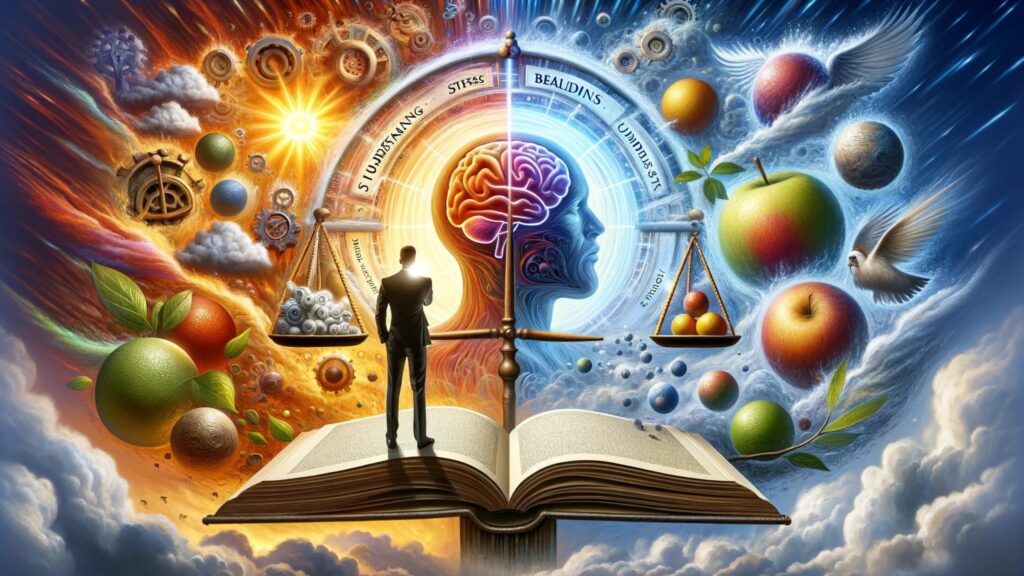
Understanding mental health and stress
Introduction to Mental Health and Stress Relief
In the complex tapestry of modern life, mental health and stress relief emerge as critical threads that contribute to our overall well-being. The discussion of these issues has progressed beyond mere conversation, becoming pivotal in shaping how we navigate the complexities of our daily lives. This introductory exploration seeks to peel back the layers of understanding mental health and stress relief, shedding light on their importance in today’s fast-paced world.
The Value of Mental Health in Today’s World
Mental health is more important than ever before. In an era of constant advancements and societal pressures, mental health is the foundation of a balanced life. It serves as the foundation for our resilience, happiness, and productivity and has an impact on every aspect of our personal and professional lives. Ignoring this critical aspect of health is equivalent to ignoring the very core of our humanity.
Define stress and its impact on mental health
Stress, a ubiquitous adversary, is the body’s natural reaction to challenges or threats. Its impact on mental health is profound and far-reaching, manifesting in a variety of ways, from temporary anxiety to chronic conditions that can shadow every step we take. Understanding the nature and effects of stress on our psyche is the first step toward mastering its tides and maintaining mental balance.
The biological and psychological causes of stress
The origin of stress is a complex interplay of biological and psychological factors. Biologically, stress activates the ‘fight or flight’ response, which releases a cascade of hormones that prepare our bodies for immediate action. Our perceptions and experiences psychologically influence stress, showing that our minds are just as important as our bodies in their manifestation.
The Mental Health Spectrum: Stress to Joy
Mental health encompasses a wide range, from the shadows of stress to the brightness of joy. This spectrum represents the human experience, encompassing the various emotions and states we encounter. Recognizing where we are on this continuum is critical for increasing self-awareness and starting the journey to a more joyful life.
Recognizing Signs of Stress Overload
Stress overload is a modern-day malaise, with symptoms that can disrupt our daily functioning and lower our quality of life. Identifying these signs, whether through physical ailments, emotional turmoil, or cognitive disturbances, is critical for taking prompt action to restore our mental balance.
How Mental Health Influences Physical Well-being
The link between mental and physical health is undeniable. Our mental state can have a significant impact on our physical health, influencing everything from our immune response to the risk of chronic diseases. Cultivating a healthy mind involves not only emotional resilience but also physical health.
The Psychology of Joy: What Makes Us Happy?
Joy, an elusive state, represents the pinnacle of mental health. Its psychology is a mosaic of personal desires, meaningful connections, and the pursuit of a purpose. Discovering what truly makes us happy is a personal journey that necessitates introspection and a concerted effort to engage in soul-nourishing activities.
The stigma of mental health
The stigma surrounding mental health is a barrier to wellness, rooted in misconceptions and societal judgments. Confronting this stigma is critical for creating an environment in which seeking help and expressing vulnerabilities are not only acceptable but encouraged.
Busting Myths About Stress and Mental Health
Myths about stress and mental health abound in the absence of knowledge, perpetuating stereotypes that can discourage people from seeking help. Debunking these myths is a shared responsibility that entails informing ourselves and others about the realities of mental health issues.
How to discuss mental health openly and supportively
Creating an open and supportive culture around mental health begins with dialogue that is empathetic, nonjudgmental, and informative. Encouraging such discussions can break down barriers to understanding and compassion, paving the way for a more supportive community for everyone dealing with mental health issues.
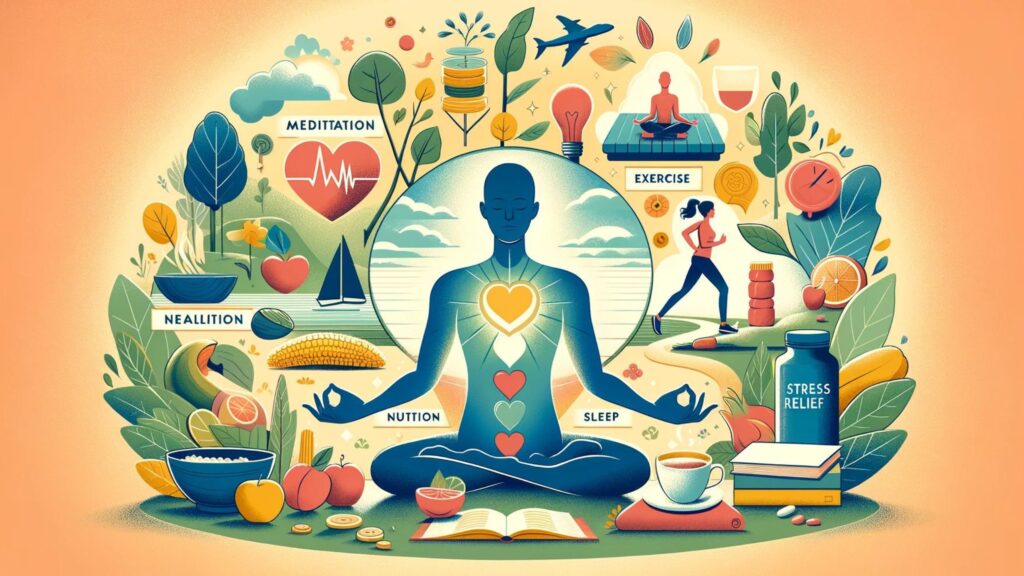
Strategies for stress relief
Mindfulness and meditation can improve mental health
People have long regarded the practice of mindfulness and meditation as a haven for those seeking refuge from the storm of stress. This ancient practice, based on the pursuit of inner peace, provides a guiding light for navigating the turbulent waters of our minds.
Mindfulness meditation encourages us to stay present in the moment, teaching us to observe our thoughts and feelings without judgment. This section delves into the fundamental principles of mindfulness meditation and advanced techniques for improving mental health and clarity.
Mindfulness Meditation for Stress Relief: The Basics
Mindfulness Meditation starts with the simple act of breathing. Focusing on the breath helps to anchor the mind in the present moment, which is an important step toward stress relief.
This practice does not aim to clear the mind of thoughts, but rather to observe them with kindness and detachedness. Begin with short, manageable sessions and gradually increase the duration as your comfort with the process grows. This gentle introduction to mindfulness can be a valuable tool in the quest for peace.
Improve Your Mental Health with Advanced Meditation Techniques
Advanced meditation techniques provide a path to profound mental health benefits for those who want to deepen their practice. Techniques like loving-kindness meditation, body scan meditation, and mindful movement foster a higher level of awareness and compassion.
These practices not only help with stress relief, but they also foster a stronger connection to oneself and the world around us, promoting overall well-being and emotional resilience.
The Influence of Physical Activity on Mental Health
Physical activity is an effective ally in the fight against stress, with the ability to transform both the body and mind. Science has shed light on the numerous ways that exercise benefits mental health, ranging from the release of endorphins to improved sleep and self-esteem.
This segment delves into the symbiotic relationship between physical activity and mental health, revealing how movement can be a powerful mental medicine.
Science supports exercise as a stress reliever
The link between exercise and stress relief is well established, with numerous studies demonstrating how physical activity influences the body’s stress response. Regular exercise strengthens our stress resilience, serving as both a preventive and therapeutic intervention.
This relationship is based on exercise’s ability to reduce stress hormone levels in the body, such as adrenaline and cortisol, while also stimulating the production of mood-lifting neurotransmitters.
Fun and engaging physical activities for all fitness levels
Physical activity does not have to be difficult to incorporate into one’s daily routine. There are numerous enjoyable and engaging exercises appropriate for all fitness levels. Whether it’s a brisk walk in the park, a dance class, or yoga, the key is to enjoy the movement. Activities that are enjoyable and accessible increase the likelihood of consistency, which enhances the stress-relieving benefits of exercise.
Nutrition and mental health
When it comes to nutrition’s impact on mental health, the adage “you are what you eat” rings especially true. A well-balanced diet nourishes both the body and the mind, helping to regulate mood and stress levels. This section sheds light on dietary choices that can improve mental health and explains the relationship between gut health and stress reduction.
Eating for Happiness: Foods That Promote Mental Health
Studies have demonstrated that certain foods, acting as natural mood boosters, can positively impact mental health. Omega-3 fatty acids, found in fish, nuts, and seeds, are essential for brain function and mood regulation. Whole grains, high in serotonin-boosting complex carbohydrates, and leafy greens, high in folate, both benefit mental health. Incorporating these foods into your diet can be a tasty and effective stress reliever.
The relationship between gut health and stress relief is significant
The gut-brain axis is a complex communication network that demonstrates the link between gut health and mental health. A healthy gut microbiome can influence brain chemistry and behavior, affecting how we react to stress. Probiotic-rich foods such as yogurt, kefir, and fermented vegetables can improve gut health by reducing stress and promoting calm.
Sleep’s Effects on Mental Health
There is a continuous loop of influence between sleep and mental health. Understanding the relationship between sleep and stress is critical for anyone looking to improve their mental health and stress resilience. This segment discusses the importance of sleep and provides practical tips for improving sleep quality.
Understanding the Sleep-Stress Connection
Sleep is an important stress regulator, but insufficient or disrupted sleep exacerbates stress and jeopardizes mental health. Sleep modulates the stress hormone cortisol, underscoring its restorative role in stress management. Prioritizing sleep is critical for maintaining balance and ensuring that the body’s stress response system works properly.
Tips to Get a Better Night’s Sleep and Improve Your Mental Health
Improving sleep quality can have a significant impact on mental health. Setting a regular sleep schedule, developing a relaxing bedtime routine, and optimizing the sleep environment are all practical steps toward better sleep.
Reducing screen time before bed and practicing relaxation techniques like gentle yoga or deep breathing can also improve sleep quality, leading to better mental health and stress resilience.

Joy as a Lifestyle
The Art of Gratitude and Mental Health
Gratitude is a powerful alchemy that transforms everyday moments into treasures, creating fertile soil for joy and contentment to grow. Modern psychology now supports this ancient wisdom, suggesting that gratitude is not just a polite gesture but a foundation of mental health.
By consciously acknowledging our blessings, we begin a shift in perspective that takes us from scarcity to abundance, stress to relief, and despair to joy.
Practices of daily gratitude for stress reduction and joy
Integrating gratitude into your daily routine can be both simple and transformative. Begin each day by listing three things you’re grateful for, whether it’s the sun’s warmth or the help of a friend.
This practice establishes a positive tone for the day ahead. Another approach is to keep a gratitude journal, recording moments of gratitude each evening. These practices not only reduce stress but also increase joy, resulting in a positive feedback loop that reinforces itself over time.
How Gratitude Affects Your Brain and Life
According to neuroscience research, gratitude has the potential to literally rewire the brain, strengthening neural pathways that promote positive thinking. Regular gratitude practice increases the production of dopamine and serotonin, neurotransmitters linked to happiness and satisfaction.
This neurological shift not only improves our mood and outlook, but it also causes a profound transformation in how we experience life, allowing us to gain a deeper appreciation for the world around us.
Building Meaningful Connections for Mental Health
Relationships play a crucial role in developing our psychological resilience, weaving threads of connection into the fabric of our mental well-being.
Social support acts as a stress reliever, offering a sense of belonging and security that is essential to our happiness. This section delves into how meaningful connections can improve our mental health and provides practical advice for strengthening these bonds.
The value of social support in stress management
Social support is more than just a nice addition to our lives; it is an essential part of stress management. Open, honest communication with friends and family fosters a support network that can catch us if we fall.
These connections provide emotional support, practical assistance, and a different perspective on the challenges we face, all of which help us manage stress more effectively.
Practical Advice for Nurturing Relationships to Improve Mental Health
Nurturing relationships requires both intention and effort. Make time for regular check-ins with loved ones, and be fully present while listening with empathy and openness.
Participating in shared activities, such as a weekly game night or a monthly book club, can help to strengthen bonds. Remember that the quality of connections is more important than the quantity, so focus on strengthening a few key relationships.
Creativity and Play: Discovering Joy in Adulthood
Adults can also find joy and rejuvenation in creativity and play. Engaging in creative pursuits and playful activities can free us from the constraints of routine, igniting a spark of joy that brightens our days.
This segment delves into how creativity and play serve as essential components of a happy lifestyle, providing pathways to stress reduction and improved mental health.
Creative Ways to Reduce Stress and Promote Mental Health
Creative expression provides a unique outlet for stress relief, allowing us to channel our emotions and thoughts into art, music, writing, or any other form of creativity that speaks to us.
This process can be extremely therapeutic, providing a sense of accomplishment and a break from daily stresses. Whether it’s painting, journaling, or playing an instrument, making time for creative activities can significantly improve mental health.
The importance of play for adults: connecting with joy
Reintroducing play into adult life can have a significant impact on our mental health. Playful activities, such as a game of tag, improvisational comedy, or simply fooling around with pets, can improve our mood and cognitive function and foster a sense of community. Embracing play as an adult not only reduces stress but also reignites the joy and wonder that enrich our lives.

Overcoming Obstacles to Mental Health
Coping with chronic stress and anxiety
Chronic stress and anxiety are formidable obstacles in the mental health landscape, casting long shadows on our quest for well-being. These persistent foes can erode the quality of our daily lives, forcing us to be constantly vigilant against an unseen adversary.
However, with the right strategies and knowledge, we can reclaim our mental territory and turn these obstacles into opportunities for growth and resilience.
Strategies for Managing Long-Term Stress to Improve Mental Health
To effectively manage long-term stress, a multifaceted approach is required. First, establishing a routine that includes stress-reduction practices like mindfulness, exercise, and adequate rest can help you build a stable foundation in your life.
Furthermore, setting realistic goals and breaking them down into manageable tasks can help prevent feelings of overwhelm. Incorporating relaxation techniques into your daily routine, such as deep breathing and progressive muscle relaxation, can provide immediate relief during times of high stress.
When Should I Seek Professional Help for Stress and Anxiety?
Recognizing when to seek professional help is an important step toward mental health. If your stress or anxiety is interfering with your ability to complete daily tasks, maintain relationships, or enjoy life, it may be time to see a mental health provider.
Professional assistance can provide tailored strategies, support, and, in some cases, medication to help you manage your symptoms more effectively, allowing you to navigate your journey to well-being with confidence and understanding.
Depression and Finding Joy: The Challenge
Depression is a formidable adversary in the pursuit of mental health, capable of reducing even the most joyous of experiences to a mere flicker. Understanding depression’s hold on the mind and body is critical for those who want to reclaim their happiness. Even in the depths of depression, the possibility of joy remains, a beacon of hope that leads us to healing and renewal.
Understanding depression in the context of mental health.
Depression is more than just a passing feeling of sadness; it is a chronic condition that has an impact on both your emotional and physical health. The first step toward treating depression is to recognize symptoms such as persistent sadness, loss of interest in activities, changes in appetite or sleep, and feelings of worthlessness. Understanding that depression is a medical condition, not a personal failure, can motivate people to seek help.
Moving Towards Joy: Actions to Take Today
Moving toward joy while dealing with depression may appear daunting, but small, deliberate steps can pave the way. Set attainable goals, no matter how small, to foster a sense of accomplishment.
Engage in activities that used to make you happy, even if they don’t seem appealing right now. Encourage social connections, as isolation can exacerbate depression. Most importantly, be patient with yourself; the path to joy is gradual, requiring compassion and perseverance.
Coping mechanisms versus healing practices
When faced with mental health challenges, it is critical to distinguish between coping mechanisms and healing practices. While coping mechanisms can provide temporary relief, they frequently come at the expense of long-term well-being, potentially leading to unhealthy behaviors. Healing practices, on the other hand, target the underlying causes of stress and promote long-term mental health.
Identifying unhealthy coping mechanisms that can harm mental health
Unhealthy coping mechanisms, such as substance abuse, excessive escapism via digital media, or overeating, may provide temporary relief from stress but eventually exacerbate mental health problems.
Recognizing these patterns is the first step toward change, paving the way for healthier strategies that benefit rather than harm mental health.
Healthy practices for stress relief and mental healing are important.
Adopting healthy habits is critical for true mental healing and stress reduction. Regular physical activity, eating a balanced diet, getting enough sleep, and practicing mindfulness can all help to reduce stress.
Establishing a network of friends, family, or support groups can also provide emotional support. For more serious issues, therapy or counseling can provide a safe space to explore and heal the underlying causes of stress and anxiety, resulting in significant and long-term mental health benefits.
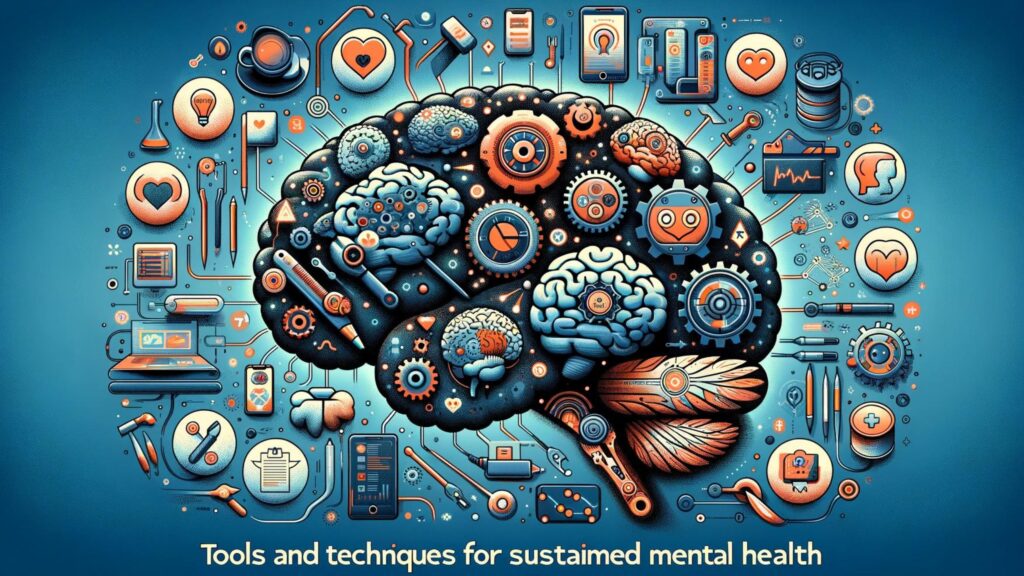
Tools and Techniques for Sustainable Mental Health
The Power of Positive Thinking in Mental Health.
Positive thinking has a profound influence on mental health. This transformative tool has the potential to shift perspectives, alter neural pathways, and pave the way for a more joyful and stress-resilient life.
Positive thinking does not mean ignoring life’s problems; rather, it means approaching them with empowerment and hope. It is a practice that encourages people to focus on their own strengths and potential, resulting in a more fulfilling and stress-resilient life.
How to Develop a Positive Mindset for Stress Relief and Joy
Developing a positive mindset begins with recognizing and challenging negative thoughts. It entails consciously shifting focus to gratitude and small victories in everyday life. Begin by setting aside time each day to reflect on what you are grateful for, no matter how small. Affirmations can help to reinforce self-belief and counteract our brain’s negativity bias. Additionally, surrounding oneself with positive influences—people, books, and environments—can help to cultivate a positive mindset.
Overcoming Negative Thought Patterns That Harm Mental Health
Negative thought patterns, such as catastrophizing, overgeneralizing, and mind-reading, can be detrimental to mental health, resulting in increased stress and anxiety. Overcoming these patterns necessitates mindfulness and self-awareness.
Cognitive restructuring is an effective technique for challenging negative thoughts and replacing them with more balanced, realistic ones. This process helps to break the cycle of negativity and promotes a healthier, more positive mental environment.
Technology and Mental Health
The intersection of technology and mental health is a two-edged sword. On the one hand, digital tools and apps provide unprecedented access to mental health resources, encouraging stress relief and overall well-being.
Excessive screen time and unrestrained use of social media, on the other hand, can exacerbate mental health conditions. Navigating this landscape necessitates a deliberate approach to technology use, emphasizing its benefits while minimizing its risks.
Digital Tools and Apps for Stress Relief and Mental Well-Being
The digital age has led to the creation of a multitude of tools and apps to support mental health. From meditation apps that guide users through stress-relieving practices to platforms that provide virtual therapy sessions, technology has made mental health support more accessible than ever.
These tools can be effective allies in managing stress, anxiety, and other mental health issues by providing resources that are only a few taps away.
Balance Screen Time for Optimal Mental Health
While technology can be beneficial to mental health, limiting screen time is essential to avoiding its negative effects. Setting clear boundaries for technology use, such as designating screen-free times or using apps that track screen time, can help to mitigate these risks.
Furthermore, engaging in offline activities that promote well-being, such as spending time in nature or having face-to-face social interactions, can serve as a healthy counterbalance to excessive screen time.
The future of mental healthcare
The future of mental health care looks promising, with innovations constantly emerging to improve treatment and stress relief. Teletherapy, digital mental health platforms, and even artificial intelligence have all made it easier to get help. These innovations have the potential to make mental health care more personalized, effective, and accessible to those in need.
Innovations in Mental Health Treatment and Stress Reduction
Emerging technologies, such as virtual reality therapy and wearable devices that monitor physiological stress signals, are driving mental health care innovation.
These tools provide novel approaches to treatment, enabling immersive therapeutic experiences and real-time stress management. As these technologies advance, they have the potential to change the landscape of mental health care, making it more responsive to the unique needs of those seeking help.
Creating a society that values and promotes mental health
Building a society that values and actively promotes mental health is critical to addressing the growing mental health crisis. This necessitates a collaborative effort from all sectors—government, healthcare, education, and the private sector—to implement policies and practices that prioritize mental health.
Education and awareness campaigns can help to reduce the stigma associated with mental health issues and encourage people to seek help when they need it. Fostering a culture of empathy, support, and resilience will be critical to developing a healthier, more compassionate society.
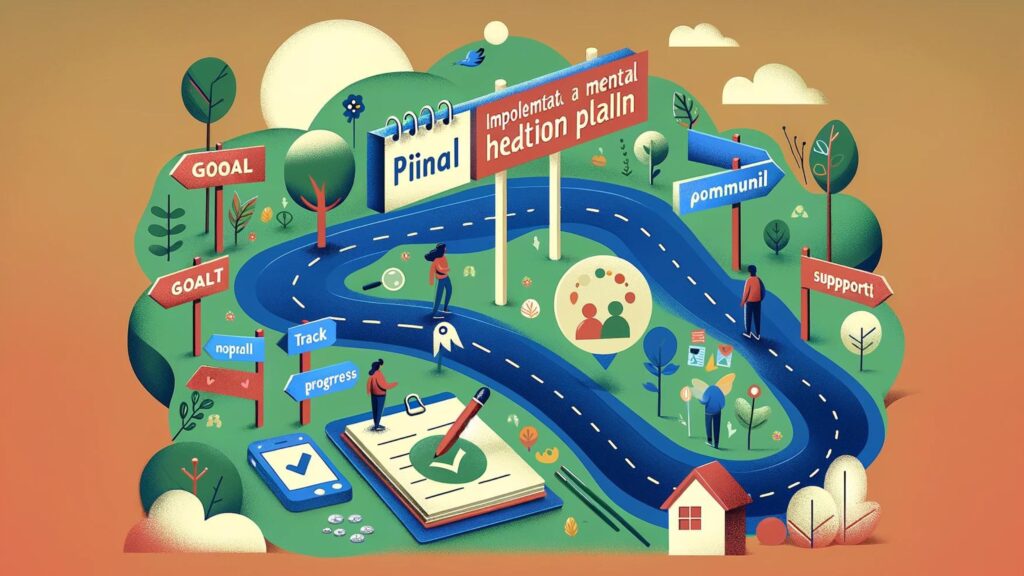
Implementing a Mental Health Action Plan
Setting Realistic Goals to Improve Mental Health
The journey to better mental health begins with setting realistic, achievable goals. These goals serve as beacons, guiding us through the fog of uncertainty and toward a clearer sense of well-being.
To establish these objectives, it is necessary to first conduct a thorough assessment of one’s current mental health status, identifying specific areas that require attention and improvement. Goals could include improving sleep habits, managing stress more effectively, or cultivating a more positive mindset.
How to Develop a Personalized Mental Health and Stress Relief Plan
Developing a personalized mental health and stress relief plan necessitates introspection and strategic thinking. Begin by identifying your stress triggers and the areas of your mental health that you want to improve.
Next, outline specific steps to address these issues, such as incorporating daily mindfulness exercises to reduce stress or establishing a consistent bedtime routine to improve sleep. Customize these actions to your lifestyle and preferences, making sure they are both practical and enjoyable, to increase adherence.
Tracking Progress and Adjusting Your Plans for Maximum Joy
Measuring progress is critical for staying motivated and recognizing accomplishments along your mental health journey. You can accomplish this by keeping a journal, using apps to monitor your habits, or just thinking back at the end of each day or week.
Be prepared to change your plan as you discover what works best for you, and view flexibility as a strength rather than a weakness. Celebrating small victories along the way fuels the desire for maximum happiness and well-being.
Community and Resources for Mental Health Support
We do not have to walk the path to better mental health by ourselves. Communities, both local and online, provide invaluable support, understanding, and resources. These groups offer a sense of belonging, shared experiences, and mutual support, which can significantly improve your mental health journey.
Find Local and Online Mental Health Communities
To find local and online mental health communities, begin by looking for mental health organizations, support groups, and forums focused on specific mental health issues or general well-being.
Social media platforms can also provide access to a diverse range of communities where experiences and advice are freely shared. Participating in these communities can help you feel more connected and supported by people who understand the difficulties you’re going through.
A Guide to Mental Health Resources and Professional Support
Navigating the world of mental health resources and professional support may appear daunting, but there are numerous options to consider. Begin by contacting reputable mental health organizations for educational materials and referral services.
Consider contacting a therapist or counselor for personalized guidance and support. Furthermore, many apps and online platforms offer therapy and self-help resources, making professional help more accessible than ever.
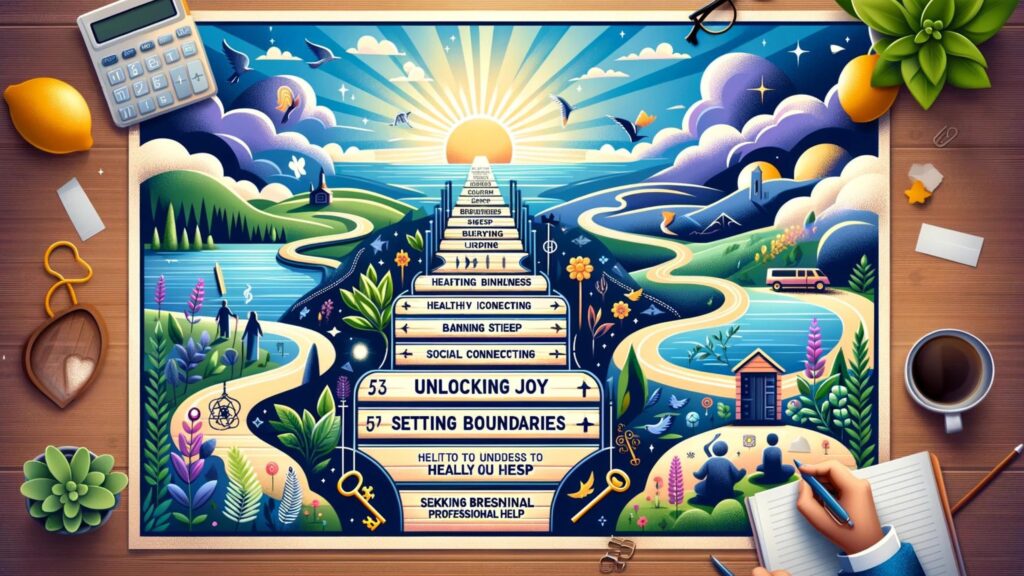
Professional Guide: Mental Health: Unlock Joy and Banish Stress
In today’s fast-paced world, maintaining mental health is more important than ever. Achieving a state of joy and eliminating stress is not only beneficial but also necessary for our overall well-being. This guide offers a step-by-step approach to improving your mental health, drawing on tried-and-true strategies and insights to help you navigate the path to a more fulfilling life.
Step 1: Acknowledge your feelings.
Clarification: Begin by acknowledging your feelings without judgment. Recognizing your emotions and stressors is the first step toward managing them.
For example, if you’re feeling overwhelmed at work, rather than suppressing your feelings, acknowledge the stress and consider its sources.
Step 2: Set realistic goals.
Clarification: Set specific, achievable goals for your mental health. These should be measurable and specific to your requirements.
A realistic goal could be to reduce work-related stress by delegating tasks or establishing clearer boundaries around working hours.
Step 3: Practice mindfulness and meditation.
Clarification: Include mindfulness or meditation in your daily routine to increase awareness and reduce stress.
For example, practice mindfulness meditation for 10 minutes every morning, focusing on your breath to help center your thoughts.
Step 4: Perform physical activity.
Clarification: Regular physical activity can help improve mental health by reducing stress, anxiety, and depression.
For example, aim for at least 30 minutes of moderate exercise on most days of the week, whether it’s a brisk walk, yoga, or a fitness class.
Step 5: Optimize your diet.
Clarification: Eating a balanced, nutritious diet benefits both physical and mental health.
For example, incorporate omega-3 fatty acid-rich foods like salmon or walnuts, as well as fruits and vegetables, to ensure you get enough vitamins and minerals.
Step 6: Improve Your Sleep Habits
Clarification: Proper sleep is essential for mental health. Set a regular sleep schedule and create a relaxing environment.
For example, aim for 7-9 hours of sleep per night and create a bedtime routine that includes activities like reading or taking a warm bath to signal to your body that it’s time to relax.
Step 7: Seek social support.
Clarification: Establishing and maintaining supportive relationships can alleviate stress.
For example, make an effort to communicate with friends and family on a regular basis, even if it’s just a quick phone call or text.
Step 8: Limit screen time.
Clarification: Excessive screen time, particularly on social media, can cause stress and anxiety.
Set aside specific times throughout the day to check emails and social media, and avoid screens at least one hour before bedtime.
Step 9: Learn to say no.
Clarification: Establishing boundaries is essential for stress management and mental health.
Example: If you’re already feeling overwhelmed, politely decline additional responsibilities, emphasizing the importance of focusing on existing commitments.
Step 10: Consider Professional Help
Clarification: If stress becomes overwhelming, consulting with a mental health professional can provide tailored strategies and support.
Depending on individual needs, this may include talking therapies such as cognitive-behavioral therapy (CBT) or medication.
Unlocking joy and eliminating stress necessitates a dedicated, multifaceted approach. Follow these steps and make small, consistent lifestyle changes to significantly improve your mental health. Remember that the path to better mental health is a marathon, not a sprint, and each step forward is a victory.
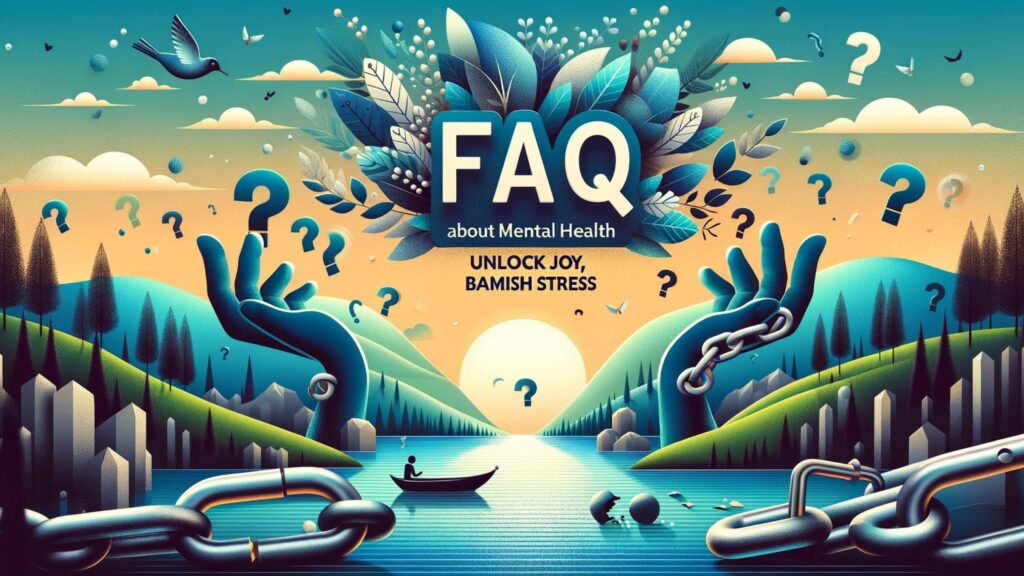
FAQ on Navigating Mental Wellness: Unlock Joy and Banish Stress
1. How do I effectively manage stress on a daily basis?
To manage stress on a daily basis, incorporate mindfulness or meditation into your routine, get enough physical activity, and eat a healthy diet. Effective time management and a relaxing home environment are essential strategies (UpJourney, Enlightio).
2. What are some signs of stress that I should look out for?
Be aware of symptoms like irritability, fatigue, difficulty sleeping, changes in appetite, and persistent anxiety or depression (Enlightio).
3. What can I do to improve my emotional well-being?
Encourage your emotional well-being by engaging in activities that promote relaxation and happiness, such as hobbies, spending time with loved ones, and expressing gratitude. UpJourney suggests that improving communication and setting clear boundaries can greatly benefit relationships.
4. What techniques help you reduce stress quickly?
Deep breathing exercises, brief meditations, and physical activities such as a quick walk or stretch are all examples of quick stress-relief techniques. Listening to calming music or engaging in a creative activity can offer immediate relief (Enlightio).
5. How can I create a work environment that promotes mental health?
To create a mental health-friendly work environment, advocate for policies that support work-life balance and open communication about mental health and physical well-being, including proper lighting and ergonomic furniture (UpJourney).
6. What should I do if traditional stress management techniques aren’t effective?
If traditional methods are ineffective, seek professional assistance to explore alternative treatment options, such as cognitive-behavioral therapy or medications. Support groups and specialized therapy can provide additional support (Enlightio).
7. How can I handle stress in my relationships?
Maintain open communication, set realistic expectations, and practice empathy to reduce stress in relationships. Recognizing when to give space and seeking out joint activities can help relieve stress (Enlightio).
8. Where can I get professional help with stress and mental health issues?
To find professional help, consult with healthcare providers, search for therapists on mental health platforms, or seek referrals from local mental health organizations (Mental Health America).
9. How does your diet help you manage stress?
A healthy diet can have a significant impact on stress levels. Consume foods high in omega-3 fatty acids, magnesium, and vitamins B and D to improve mood and reduce stress (Enlightio).
10. How important is sleep to managing stress?
Sleep is critical to stress management. Sleep deprivation can exacerbate stress, whereas getting enough sleep can improve problem-solving abilities and emotional regulation. Maintain a consistent sleep schedule to improve your mental health (Enlightio).
Conclusion
Mental Health: Understanding how to find joy and reduce stress is critical in today’s fast-paced world. By proactively addressing mental health issues, you can improve your quality of life, cultivate a positive mindset, and embark on a path to profound personal wellness.
Discover more about improving mental health—click here to read related posts!

